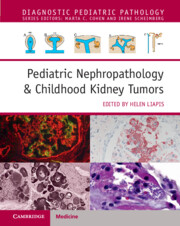Book contents
- Pediatric Nephropathology & Childhood Kidney Tumors
- Diagnostic Pediatric Pathology
- Pediatric Nephropathology & Childhood Kidney Tumors
- Copyright page
- Dedication
- Contents
- Contributors
- Preface
- Section 1 Normal and Abnormal Human Kidney Development
- Section 2 Glomerular Diseases
- Section 3 Tubulointerstitial Diseases
- Section 4 Vascular Diseases
- Section 5 Infectious Diseases
- Section 6 Cystic Diseases
- Section 7 Solid Tumors of the Kidney
- Section 8 Transplant Pathology of the Kidney
- Chapter 18 Transplant Pathology
- Index
- References
Chapter 18 - Transplant Pathology
from Section 8 - Transplant Pathology of the Kidney
Published online by Cambridge University Press: 10 August 2023
- Pediatric Nephropathology & Childhood Kidney Tumors
- Diagnostic Pediatric Pathology
- Pediatric Nephropathology & Childhood Kidney Tumors
- Copyright page
- Dedication
- Contents
- Contributors
- Preface
- Section 1 Normal and Abnormal Human Kidney Development
- Section 2 Glomerular Diseases
- Section 3 Tubulointerstitial Diseases
- Section 4 Vascular Diseases
- Section 5 Infectious Diseases
- Section 6 Cystic Diseases
- Section 7 Solid Tumors of the Kidney
- Section 8 Transplant Pathology of the Kidney
- Chapter 18 Transplant Pathology
- Index
- References
Summary
Given the superior outcomes compared to dialysis, most children with end-stage kidney disease (ESKD) are currently referred for kidney transplantation. Kidney transplants are exposed to various types of injuries that occur as a result of hemodynamic disturbances, transplant rejection, infections, drug toxicity, metabolic disorders, and the recurrence of diseases originating in the native kidneys. Kidney allograft biopsy is the primary tool in the diagnostics of graft pathologies, enabling identification of lesions that may potentially be stopped or slowed down with proper treatment. The majority of kidney transplant histopathological images are not fully specific and therefore must be interpreted in context. In recent years, serological testing for the detection and monitoring of antibodies directed against transplant and non-transplant antigens in the graft, as well as molecular approaches aiming to trace changes that develop in the transplant based on fluctuations in gene expression have added to the pathology repertoire. The widening spectrum of tests and methods available has deepened our understanding of transplant pathology and also improved the accuracy of diagnosis.
Keywords
- Type
- Chapter
- Information
- Pediatric Nephropathology & Childhood Kidney Tumors , pp. 341 - 366Publisher: Cambridge University PressPrint publication year: 2023

